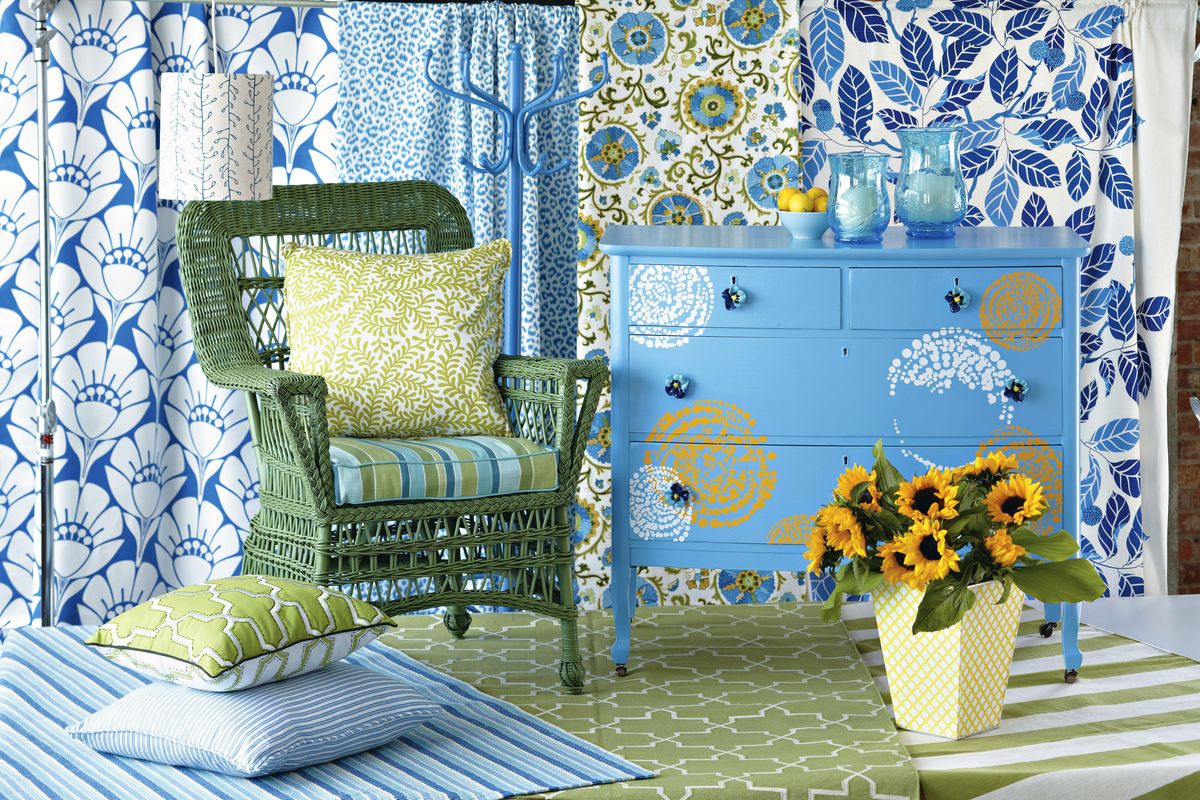With spring refurbishing, many homeowners are taking a DIY approach

But that doesn’t mean you’re stuck with Aunt Edna’s floral couch for another year. More and more homeowners are rolling up their sleeves and refurbishing tables, chairs and couches themselves, designers say.
“Frugality and practicality are still at the forefront of people’s minds right now, so updating and making the best of what you already have is a surefire way to save money and recycle,” says Rachael Liska, senior editor at Fresh Home magazine.
It may seem daunting, especially if you’re a do-it-yourself newbie, but starting small and taking your time can ease stress or anxiety.
“The way we sort of think of it here is you’re dressing your furniture on a level that everyone really is comfortable with,” says Danielle Claro, home editor at Real Simple magazine.
“Think about getting a haircut, jewelry or clothes for yourself. You don’t have to completely remake a piece. You get can a lot of bang for your buck, even if you’re not super handy.”
Have a clear idea of what you want to do before you dive in, Liska adds.
“Look to magazines, bloggers and designers, or even artwork for inspiration,” she says. “And be sure to have everything you need – all your supplies – on hand.”
Painting
Painting is by far the easiest way to spruce up an old piece of furniture.
A dull pine table can become a sleek modern piece with a coat or two of glossy black paint. Enamel paint is cheap, and spray paints now come in almost any color you can imagine and adhere to just about any surface, says Cindy Thomas, editor and owner of Frugalsimplicity.com.
Claro suggests painting a mirror’s frame with a glossy color, or taking an old wooden Windsor chair and sanding it, priming it and coating it with a fresh spring color like orange or turquoise.
“That’s the kind of thing where if you have a white kitchen and you throw an orange chair in there it can revive the whole room,” she says.
But, Claro stresses, don’t paint a piece you love – and certainly not an antique.
Emily Henderson, host of HGTV’s “Secrets From A Stylist,” offers a strict rule for painting furniture: “If the pieces are over 50 years old, don’t do it. You’ll lose the charm and age that makes the piece beautiful.”
Staining/waxing
Instead of painting, Henderson suggests stripping and waxing old furniture to bring out the wood’s beauty and color.
Stripping and staining is a bit more work, but is still a relatively inexpensive way to change things up while keeping the furniture’s original look.
Don’t choose a stain that’s much darker than the natural wood, Henderson says, but “stick in the same tone of wood.”
You’ll likely need to remove the original finish with a paint and varnish remover first and sand out any imperfections. Then add the stain based on the package directions, and apply a coat of varnish to protect the surface, Thomas says.
“Reupholstering can be an expensive mistake, but when it comes to refinishing, in general it can always be stripped back,” says Henderson. “I’ve totally done that. I had one chair where we tried it three different times before we got something we liked.”
Embellishing/ accessorizing
Painting and staining are tried-and-true techniques for updating furniture, but Liska says a fresher take is to try gilding, decoupaging, decaling or embellishing old pieces with materials such as decorative nail heads, leather trim, cording and tassels.
Try trimming a tired sofa chair with some gilded cord to change its personality and give it a more “boudoir, European” look, Henderson suggests.
“All it takes is $10 and a glue gun, and it’s removable,” she says.
At DIY Network, designers added a mod touch to an old brown dresser by decoupaging the drawers and sides with plaid wallpaper.
Their instructions: Using pre-pasted wallpaper, dip it in water, smooth it onto the drawers with a sponge and allow it to dry about four hours. Then apply a decoupage medium with a sponge brush to the drawer fronts, allow that to dry, and finish the project with a set of more refined pull knobs to give the piece a more elegant feel.
Changing out the hardware on a dresser or side table is one of the easiest ways to make it over. Brass insects and other animal-shaped knobs are hot right now, as are clear and colored glass for a more vintage feel, Claro says.
“One thing with knobs: Buy several and try them all,” she says. “Look at them in the context of the room before you make an investment and put time in. It makes a big difference.”
Reupholstering
By comparison, reupholstering is a lot of work and takes practice. But it can be one of the most professional-looking ways to update an old chair or couch.
Slip covers are a cheaper, easier alternative. Henderson still swears by reupholstering, and says it’s not that hard if you stick to the right fabrics.
“I buy pieces for $100 and reupholster them for $200 or $300,” she says. “It’s a one-of-a-kind piece and it’s customized for you.”
Henderson loves washed linens, though they’re not terribly durable, so try them on side chairs first if you have kids.
Cotton velvet is another favorite that’s cozy and more durable. It usually starts at just $10 a yard, she says.
Hot patterns this spring are Ikat, any ethnic print and matte-printed cottons over something shiny, Claro says.